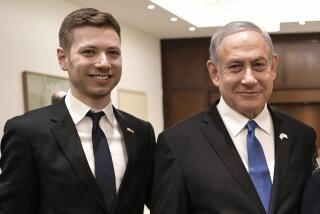Kirkuk Stumbles Toward Democracy
- Share via
KIRKUK, Iraq — To the list of things best not watched in the making, such as laws and sausages, add Iraqi democracy.
A U.S.-brokered leadership convention Saturday selected part of an interim government for this ethnically tense city. But the first steps toward democratic rule could be taken only after the detention of five Arab delegates suspected of ties to Saddam Hussein, an attempt by Kurds to pad their delegation’s numbers and accusations that the U.S. commanding general here stacked the city council to his liking.
In one encouraging sign, the most annoyed group -- Kirkuk’s Arabs -- stayed to the end instead of making good on threats to boycott the convention.
“This only happened to Arabs, although all ethnic groups belonged to the Baath Party. It is a kind of discrimination,” fumed Wasfi Assi, delegation leader and a kinsman of one of those detained by U.S. troops and led away in handcuffs. “We were humiliated. But we have to look to the future of this city, which is why we continued even while we were in pain.”
The U.S. administrator for postwar Iraq occupation, L. Paul Bremer III, vowed recently to see those who were complicit with Hussein’s reign excluded from the new administration that U.S.-led forces are attempting to build.
“We’re not going to tolerate any senior Baath Party member in this government,” Maj. Gen. Ray Odierno, commander of the U.S. Army’s 4th Infantry Division, said of the last-minute detentions. He said the vetting process for the convention had taken time to complete and confirmation that five delegates had been involved in the former regime had come to light only the night before.
“They were not happy with that at all. They were especially ticked off that it happened today, just before the elections,” Maj. Jeff Cantor, commander of civil affairs for the division, said of the delegates’ detention as they arrived for the convention. “But we had to do it. Two of them probably would have won a seat on the council if we hadn’t detained them.”
Two other Arabs chosen by their ethnic compatriots were arrested Thursday, reducing their delegation from 39 to 32. However, the Arabs still were awarded their promised six seats on the 30-member city council.
A mayor, deputy mayor and three assistants will be chosen from council members on Tuesday. They will oversee resettling former residents, designing the new government and eliminating Baath Party influence.
Kirkuk is the second major Iraqi city to tackle self-government, or at least local administration of those tasks that the U.S. occupation forces cannot or would rather not handle. Mosul, another ethnic jigsaw puzzle, seated a similar transition government last month.
Odierno, in an address to the delegates, sought to assure them that the American troops in their city and suburbs, which together include 1.2 million people, want to hand over the reins of power as soon as safely possible.
“I didn’t want to wait until a national government gets set up because that could take a long time,” said the general, referring to the stalled efforts in Baghdad to get some Iraqi input into the daily workings of public service.
The Kirkuk convention was announced two weeks ago. Each of the city’s four major ethnic groups -- Arabs, Kurds, Turkmens and Assyrians -- was invited to send a 39-member delegation from which they would be allowed to select six to sit on the city council. Another six council members were to be selected from among 144 delegates invited by Odierno and his staff to represent “independent” social groups such as teachers, lawyers, religious leaders and artists.
Four of those six independent delegates chosen for the council Saturday were Kurds, one an Assyrian and the other of mixed extraction. That triggered heated protests from the Arabs, two of whom were eventually asked to leave the auditorium.
“This is unfair. This is a compact between the Kurds and the Turkmens to outnumber us!” railed Abdul Rahman Assi, demanding a fresh round of voting.
“They must revise this decision, there is no alternative,” said Mustafa Kemal Yaycily of the Iraqi Turkmen Front.
Odierno, who selected the six independent delegates, defused tensions by promising to take another look at the outcome. “I have the right to reject any independents. I will review the situation,” he said, promising a final decision by today and warning: “When I make my decision tomorrow, everyone must abide by it.”
Ethnic Kurds also were displeased when their attempt to bring in four “advisors” in addition to their allotted 39 delegates was rejected. The four were sent home, grousing to reporters as they left that their longtime U.S. allies in the battle to oust Hussein seem to have forgotten their suffering and contribution.
Kirkuk, Iraq’s biggest oil-producing city and thus a plum in the postwar redistricting, still crackles with ethnic tension despite having a more functional public service network than other larger Iraqi cities. But Hussein focused his drive for “Arabization” here, ethnically engineering the Kurdish majority out of existence by expelling as many as 250,000 Kurds from the area and giving or selling their homes to Arabs.
Spontaneous efforts to reverse that injustice have brought hordes of armed young Kurds to the city at night to chase away the Arab settlers. At least 11 people have been killed in recent violence. Kurdish leaders have appealed to their constituents to be patient and let a legal process determine property rights.
All involved in the new government effort concede that the resettlement issue is the most pressing and could undermine efforts to seat a stable interim leadership unless resolved soon.
More to Read
Sign up for Essential California
The most important California stories and recommendations in your inbox every morning.
You may occasionally receive promotional content from the Los Angeles Times.














